Irreverent Showrunner Paddy Macrae on Peacock Drama’s Inspiration
|
Paddy Macrae has come a long way as a writer since his first project in the Australian TV movie Godsend in 2010, which would become the impetus to his Peacock series Irreverent, his first as showrunner. The show follows Paulo Keegan (Colin McDonnell), a criminal mediator from Chicago who flees to Clump, Australia – a small, eccentric beach town posing as Reverend Mackenzie “Mack” Boyd (PJ Byrne) hundreds of miles away from civilization and phone reception. To stay alive, “Mack” must keep the wool over the town’s eyes and play the role of devoted Reverend while desperately searching for an exit strategy before his past catches up to him. Macrae spoke to Bleeding Cool on how the show came to be, how it changed from its original incarnation, and creative inspirations.
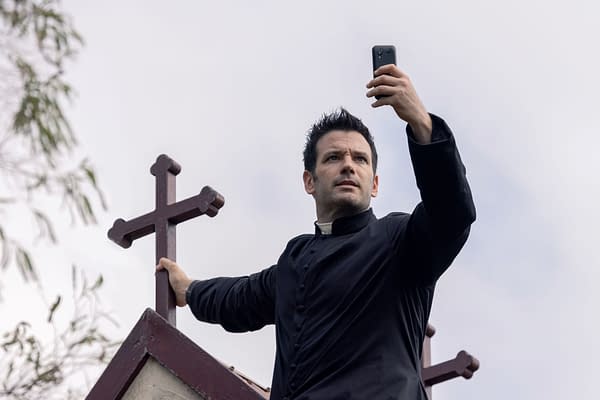
Bringing ‘Irreverent’ to Life
Bleeding Cool: What’s the inspiration behind ‘Irreverent?’
Macrae: It comes from a pretty personal place. I grew up in regional Australia in a small country town as a “PK” or a preacher’s kid. My dad and both of my grandfathers were Christian church ministers. I grew up in the man’s house beside the church with my sisters and brother. I bore witness to the chaos of small church life. The stories that walk in the door and the different parts of the community your parents get involved in. It comes from a personal place. Mom and Dad were always protesting and agitating. They were socially progressive people. Dad got arrested a couple of times and went to prison once. I like the idea of a character, who was in the pulpit, but a little bit different and extrapolated that out into an actual criminal who had no theological training at all but had the skillset that made him quite useful for helping people as a criminal mediator. To test the effectiveness of someone who cared and wanted to serve people. Putting him in that role and seeing how that went came from a very personal place. We wrote and shot a pilot for it in 2010, which was about 12 years ago when we were at film school, then developed it over many years, and here we are.
How different was your original concept before the final product?
In essence, it’s not that different at all. It was a crook fleeing a life of crime who was mistaken for a reverend and had to run with a mistake. What changed? Throughout a long 12-year development, a lot of those ancillary things. A lot of things change in terms of location and casting had an impact when an American network came on. We were overjoyed in the lead, becoming an American from Chicago. A lot of those things changed, but the essence of the show is about someone who is learning that happiness doesn’t come from taking rather, it comes from living and connecting, and a story about community stayed the same.
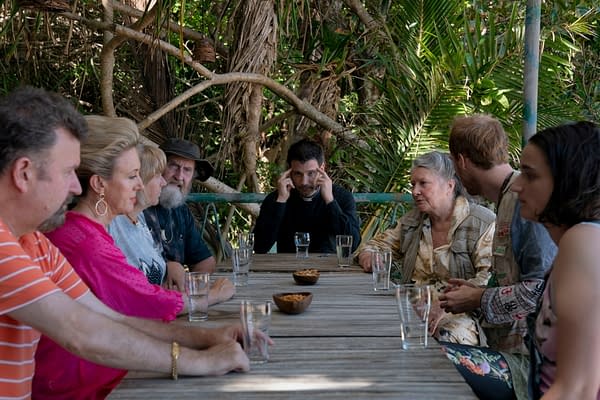
How has your other work on TV helped you process the show and refine it?
It’s all been amazing training. I’ve been working at Matchbox Pictures, the production company that made ‘Irreverent’ for about eight years and working for some incredible producers and executive producers. I’ve been lucky to have a front-row seat across development, casting, locations, hiring directors, and heads of departments. A lot of the craft, not just writing but the management of being an executive producer and showrunner, I was incredibly lucky to pick up from my mentors. Tony Ayres, in particular, I started work as a producer assistant [for him] four years ago at Matchbox. All that stuff impacted the way I ran this show and gave me the skills to be able to pull off what is a super stressful job.
What was the most invaluable lesson you got coming from doing TV movies and series to leap into show running?
The biggest lesson I learned was to distill down exactly what the core of your show or idea is, exactly what you want to say with the show, and protect that. As soon as you go into pre-production and production, you’ll get an absolute wall of noise. You get networks, studios, heads of department, cast, and anyone who has anything to do with the show giving you opinions. You have two dozen meetings a day on set and working in different time zones. To distill down that thing, protect exactly what the show is, and be ready to compromise on the things that matter not quite so much.
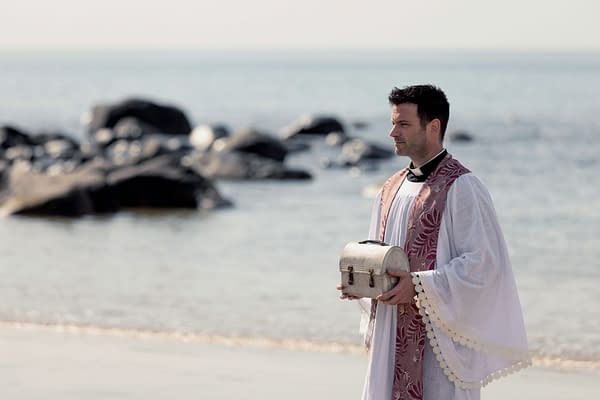
Can you break down how the core of the cast made the show work and how they helped bring your vision to life?
We’re incredibly lucky with the cast. We had Colin Donnelly, number one. We had the extraordinarily talented P.J. Byrne in number two playing Mackenzie. Beyond that was this extraordinary cast of Australian characters Wayne Blair, Kylie Bracknell, Tegan Stimpson, and Ed Oxenbould, amazing names in Australia. They were incredible. They came on from the beginning. The casting process was very intensive and particular. We spent a lot of time getting that cast right when they came on. They did that incredible dance of understanding from a scripted level what that character had to do as a function within the scope of the show, but also bringing their input, research, heart, and experience into that show. All of a sudden, we saw this town come to life, and it was the most gratifying moment of my life to see characters come off the page and into our town. Our cast is incredibly, dramatically diverse and brings a rounded picture to the show.
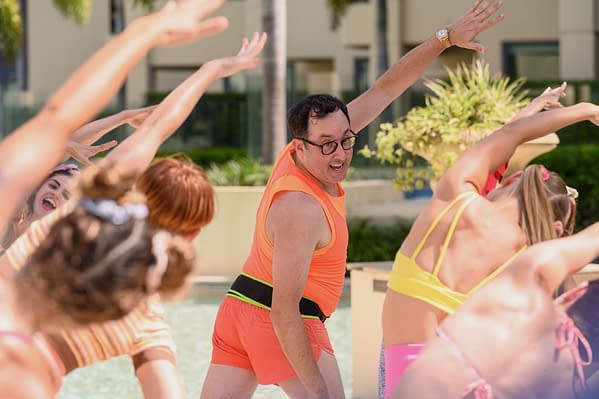
Were there any moments where the actors improvised?
It was an intricately plotted show. So, generally speaking, we stick to the signposts. We get printed sides for the day. We’ll sit down and read a scene before we shoot it, get it up on its feet, and took it out with the director. Colin and I would sit there with the pen and the sides and change a few things. Colin’s American, and I’m not. For the tone of voice, he would take control, which was incredibly good of him. Some actors would adlib more than others. Colin ironed his character, so he was able to channel that voice well, which is helpful for me as a writer. PJ Byrne is a comedic genius, and he would not improvise but prepare outlines, and we’d sit in his trailer before the scene, go through and pick the funniest lines. We’d workshop them, and that was a whole lot of fun. There are a lot of his lines in the show of his that get big laughs that I fully intend to take credit for writing that I had absolutely nothing to do with [laughs].
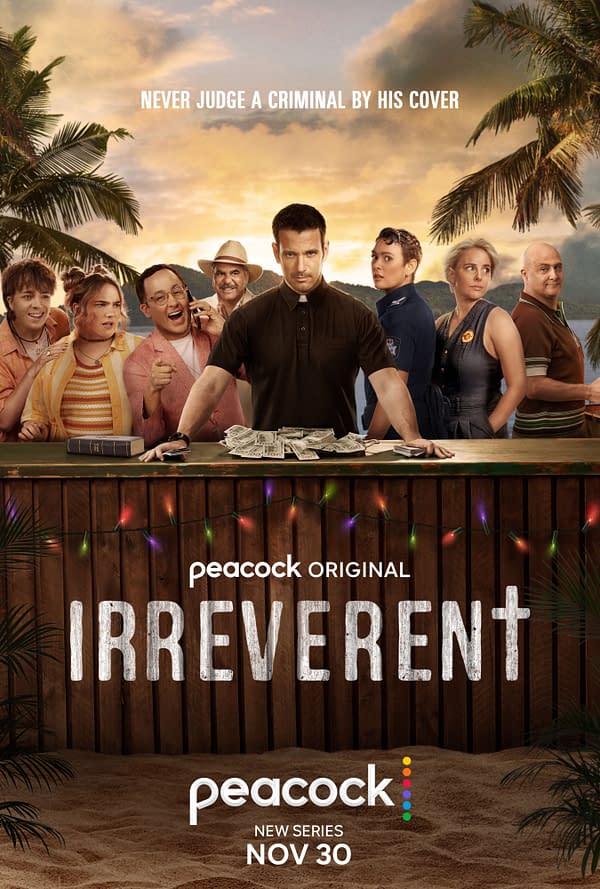
What were some of the creative minds and the writers & directors that influenced your style in your career and how has it extended to the show?
Oh, man, that’s a great question. There are so many over such a long period. The creative writer or producer who has influenced me most at a personal level and how I operate myself is my old boss, Tony Aryes, who taught me how to produce, how to showrun and run a writer’s room. That way of operating and writing character-based things, character-led dramas as opposed to plot-led dramas, having character-led plot routes the other way around, definitely came from Tony Ayres.
I have a wild list of influences across my career, like David Lynch, who was one of the biggest I had as a teenager. ‘Twin Peaks’ blew my mind, and this idea of a small weird town in the bush. I’ve always loved small-town shows because I’m from a small town. Something like ‘Twin Peaks,’ while tonally a million miles away from ‘Irreverent.’ was original the way of thinking in that show, but also the incredible comedy among legitimate horror was such a beautiful mix. Our time is different, for sure, but I love this idea of the heartfelt, compelling, scary, and suspenseful being interspersed with genuine belly laughs. In addition to Lynch having a huge impact, there are countless writers and directors. Aaron Sorkin was, without a doubt, the biggest writing influence on me in my life. I don’t write like him, but he scripts ‘The West Wing,’ which I’m a superfan for and made me want to work in TV.
Irreverent is available to stream on Peacock.
For all the latest Comics News Click Here
For the latest news and updates, follow us on Google News.

